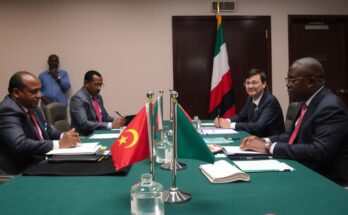The Lebanese Australian community is experiencing renewed trauma following Israel’s attacks on Lebanon, with distressing memories of past conflicts resurfacing. This resurgence of violence has led to increased anxiety, a rise in Islamophobia, and significant community mobilization for support and protests. Amidst evacuation efforts by the Australian government, calls for humanitarian aid and a ceasefire reflect the community’s longing for peace and stability.
The recent military actions by Israel against Lebanon have reignited painful memories within the Lebanese Australian community, particularly in urban centers like Melbourne and Sydney where a significant Lebanese presence flourishes. Current news reports, combined with social media images detailing the ongoing conflict, have intensified feelings of anxiety and trauma among those with familial ties to Lebanon. Michael Kheirallah, the chairman of the Victorian Lebanese Community Council, underscored the profound emotional toll these events carry, as many community members have relatives directly affected by the strife. This situation harkens back to the Lebanese Civil War that led to many fleeing to Australia, where they have since established vibrant cultural roots. Historically, the migrations of Lebanese individuals to Australia were significantly amplified during the Lebanese Civil War from 1975 to 1990, which claimed approximately 150,000 lives and displaced millions. Many arrived with deep roots in Lebanese culture, contributing widely to Australian society through cuisine, traditions, and community life. Currently, amidst violence, more than 3,400 Australians, including permanent residents and family members, are being evacuated from Lebanon. One evacuee shared his experiences and the chaos resulting from drastic bombings, highlighting the profound disruption and urgency of the situation. Overall, his perspective reflects the resilience of Lebanese people to endure repeated crises, yet acknowledges the growing need for support and relief for those are fleeing their homes. Moreover, the current conflict has also seen a concerning rise in Islamophobic sentiments and incidents within Australia, particularly following the attack by Hamas on October 7, 2023. The Islamic Council of Victoria has reported a spike in anti-Muslim incidents at universities, indicating a broader trend of intolerance that the Lebanese Australian community must navigate along with the trauma of their homeland’s conflict. Notably, the Australian government has faced criticism for its perceived pro-Israel stance, which some community leaders argue has estranged Muslim Australians. The government has since appointed envoys to address both Islamophobia and anti-Semitism, yet community voices argue that more needs to be done to foster understanding and acceptance. The situation has spurred large-scale pro-Palestinian protests across major Australian cities, which have been largely peaceful despite incidents that attracted media attention. Additionally, recent discussions by the Australian government support humanitarian aid efforts, with a recommendation for an immediate ceasefire in the ongoing conflict. However, with anxieties remaining high and community members engaged in active support for those affected, the Lebanese Australian community awaits much-needed resolution and peace in Lebanon.
The ongoing conflict between Israel and Lebanon has significant historical roots, impacting Lebanese Australians deeply. The Lebanese Civil War (1975-1990) and subsequent Israeli invasions have created a legacy of trauma for those with connections to Lebanon. Australian Lebanese individuals have established roots in Australia, contributing to the socio-cultural fabric while simultaneously grappling with the repercussions of violence in their homeland. The community, a blend of both Christian and Muslim faiths, faces recent challenges, including a rise in Islamophobia, linked to increased tensions in the Middle East. The Australian government’s response to the conflict, including humanitarian aid and evacuation efforts, impacts the Lebanese Australian populace, leading to calls for greater support and understanding across communities.
The latest Israeli attacks on Lebanon have profoundly affected the Lebanese Australian community, reacquainting them with the painful memories of their homeland’s civil conflict. These events not only trigger trauma but also incite a troubling rise in Islamophobia in Australia, challenging community cohesion. While the Lebanese Australian diaspora continues to deepen its roots while drawing on resilience during crises, there remains an urgent need for government interventions that promote understanding and foster a unified response to regional conflicts affecting their community.
Original Source: www.aljazeera.com




